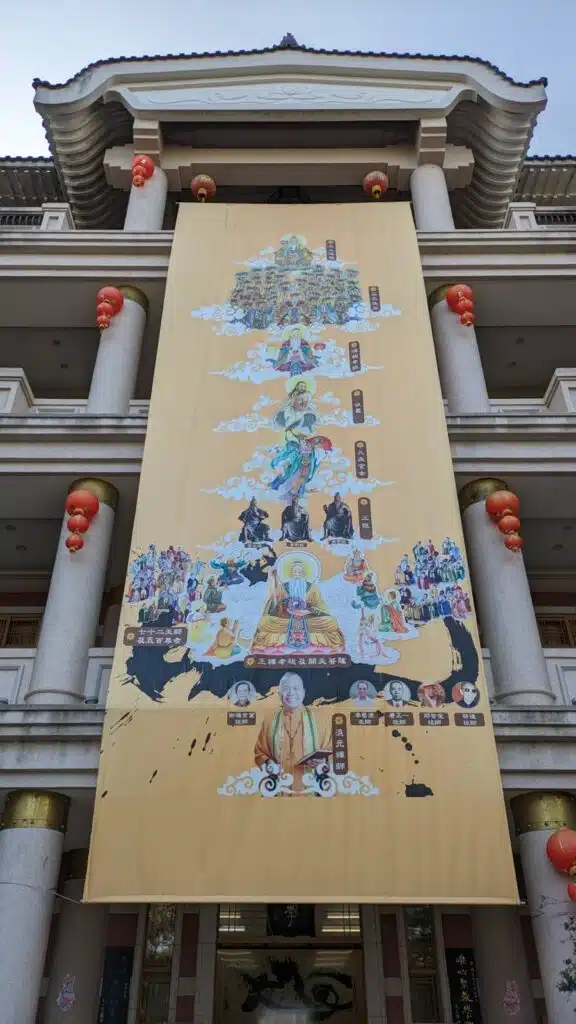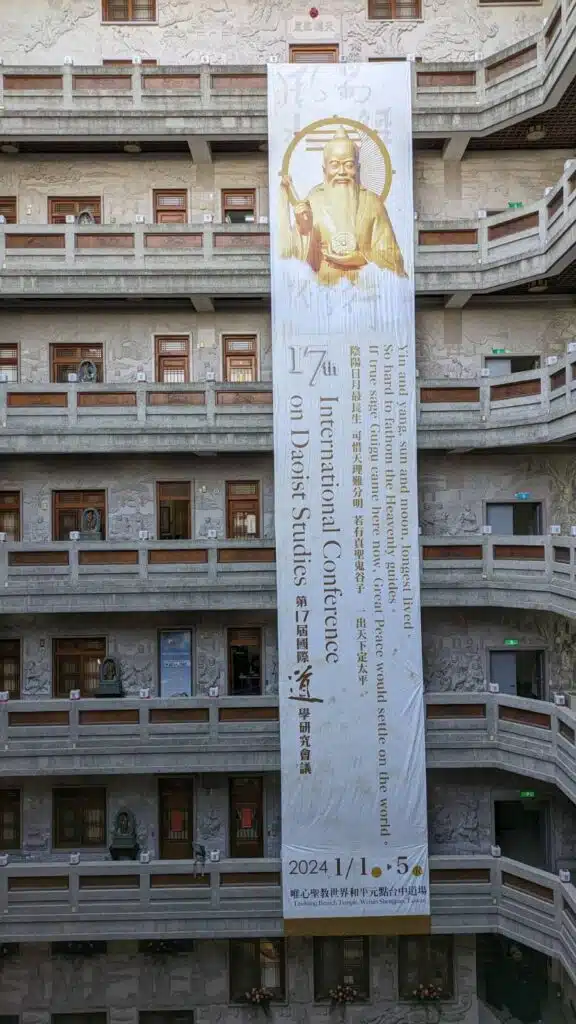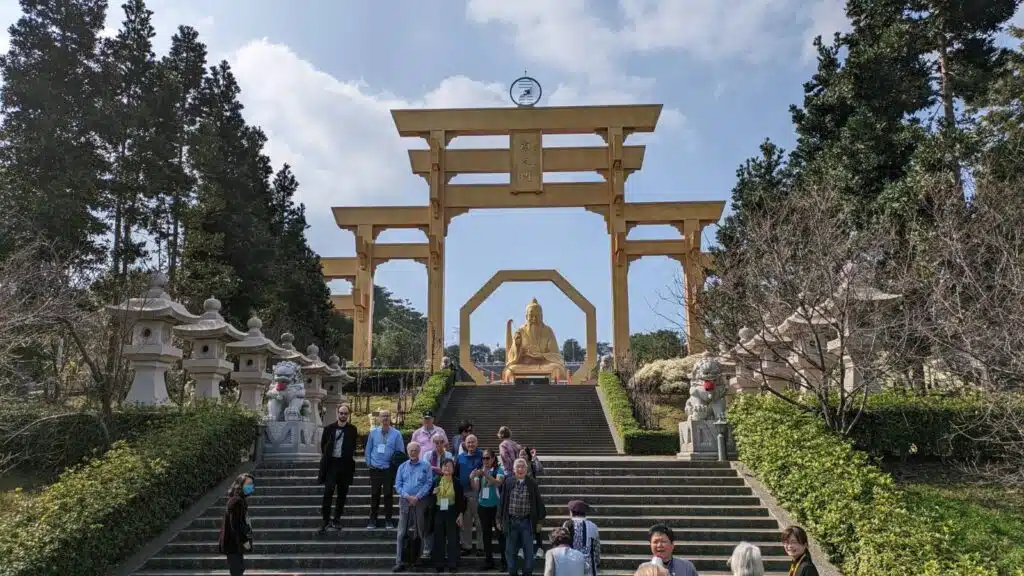
The brainchild of Livia Kohn, professor emeritus of the Department of Religion at Boston University, the International Conference on Taoist Studies has been held in Bulgaria, England, France, Germany, the People’s Republic of China, the United States, and, for the second time now, Taiwan. This year’s conference, entitled “Taoist Ways of Enhancing Life—I Ching, Feng Shui & Personal Cultivation,” was held from January 2 through 4 in the central Taiwanese city of Taichung.
The conference was hosted in the palatial headquarters of a modern religious movement known in English as “Weixinism” or “Weixin Shengjiao,” which roughly translates as “The School of the Sagely Mind-only Teachings.” Weixinism was founded in the 1980s by a Taiwanese former land surveyor, Chang Yi-Jui, who professed to have received a series of divine revelations while recovering from a life-threatening illness. Chang took the religious name Hunyuan Chanshi (“Zen Master of the Primordial Chaos”) and founded Weixinism’s first temple in Taichung in 1984. According to Chang, the spiritual transmissions he received primarily came from Guiguzi (“The Master from the Valley of Ghosts”), a semi-historical figure associated with a book of political strategy dating to China’s Warring States period (403-221 BCE) or Han dynasty (206 BCE-220 CE).

Weixinism temples feature a mix of Buddhist, Taoist, and folk religious iconography, symbolism, and nomenclature, as well as daily ritual services. Many members also devote themselves to the study of I Ching divination and feng shui practices—neither of which have historically had strict religious associations—by enrolling in the group’s formally accredited I Ching University master’s degree programs. Additionally, Weixinism holds a yearly “Chinese United Ancestors Worship Ceremony” drawing crowds in the tens of thousands. These ceremonies of ancestral worship are held to be capable of “dispelling calamities.” Weixinism’s literature explains that they helped to bring an end to the 2003 SARS epidemic, volcanic activity in Yellowstone Park in the US in 2012, and global grain crises in 2015-2016.
Presentations at the conference were roughly divided into three categories, the first of which was the presentation of academic papers in both Mandarin and English by researchers hailing from Taiwan as well different parts of Asia, Europe, and the Americas (reflecting elevated regional tensions, none of the PRC nationals whose papers were accepted by the conference were permitted by their government to visit Taiwan, whereas over a dozen Chinese scholars were able to attend the 16th International Conference on Taoist Studies, held in Leeds, England in June 2023).

Notable papers on Taoism included Cheng Tsan-shan’s “Taoist myth narratives and belief systems during the Song dynasty,” Mao Ti-sheng’s “Contemporary Taiwanese Taoist Heavenly Master Zhang and the inheritance of scriptures,” Mattias Daly’s “Ungrounded certainty: the methods, texts, and false history of sexual inner alchemy in the scholarly imagination,” J. Gordon Melton’s “The rise and fall and revival of traditional Chinese ‘Taoist’ temples in America,” Liu Jing’s “The practice of freedom in early Taoism,” Hong Chang-cheng’s “Treating the illness or healing the mindset: lamp-lighting at Taoist altars in Tainan,” and Terry Kleeman’s “Eat, drink, and be solemn: Taoist ritual food and world ecology.”
Academic papers presented at the conference were not limited to Taoism-centric research. Michael Wesch’s “The living Tao: a visual exploration of Taoism in Cao Dai Cosmology” introduced the highly syncretic iconography of Caoidaism, a thriving Vietnamese religious movement that began in the early 20th century (and which had numerous Vietnamese members in attendance at the conference); Bernadette Rigal-Cellard’s “K-Messiah Cho He-Seung and Victory Altar” gave an overview of contemporary Judeo-Christian-adjacent messianic movements in South Korea; while Lee Wing-tat examined the Eastern Han dynasty philosopher Wang Chong’s partial rejection of ideas coming from early Taoist thought.

The second category of presentations centered on personal experiences with various aspects of what might broadly be called “cultivation traditions.” The majority of the presentations made in Chinese were given by members of Weixinism’s flock, who shared personal experiences and case studies using feng shui and the I Ching. These firsthand studies included in attempts to increase factory output, promote home safety, develop businesses, make school grounds more conducive to academic success, foster intergenerational familial harmony, and even to repair automobiles through divination and geomancy. A number of presentations in a similar vein were given in English, including Radu Biki’s “Wandering the diviner’s path: a self-experimentation in Taiwanese divination practice,” Rosita Šoryte’s “Reiki West and East: the perpetual search for a universal energy,” and Abraham SY Poon’s “Qigong cultivation of yin and yang circulation based on the I Ching.”
The final category of presentations involved English-language demonstration sessions held by long-term adherents to Weixinism. They included Master Yuan-yi’s “Demonstration on I Ching divination,” Master Yuan-quan’s “Siting houses and furniture with feng shui,” and “Chanting with Dharma instruments” by Masters Yuan-yao and Yuan-zi.

Following the conference’s conclusion, on January 5 two busloads of visiting scholars traveled to Taiwan’s landlocked Nantou county to explore a large Weixinism temple located in a sylvan setting as well as the group’s massive hilltop campus (home to I Ching University lecture halls and a monumental statue of the sage Guiguzi) located on a high ridge praised by adherents for its ideal feng shui properties. Presentations were given on Weixinism’s history and its efforts to spread its teachings, which have not been without success. The organization reports a membership of over 300,000, with forty-eight branch temples throughout Taiwan and satellite temples in Australia, Canada, Japan, Malaysia, the People’s Republic of China, Spain, the United States, and Vietnam.